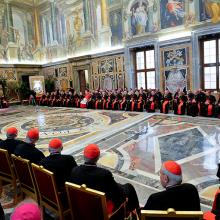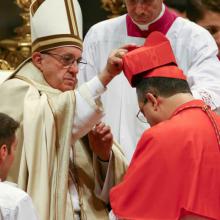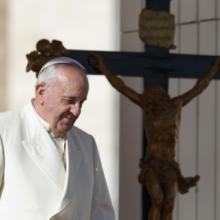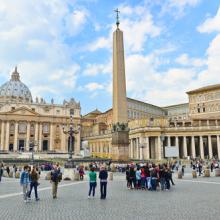roman curia
As Pope Francis marks the fourth anniversary of his revolutionary papacy, the pontiff apparently finds himself besieged on all sides by crises of his own making: an open “civil war” in the Catholic Church and fears of schism, mounting opposition from the faithful, and a Roman Curia so furious with his reforms that some cardinals are plotting a coup to topple him.
At a solemn ceremony in St. Peter’s Basilica, to elevate 17 new cardinals, Pope Francis, on Nov. 19, delivered a ringing plea to the world, and his own Catholic Church, to reject “the virus of polarization and animosity," and the growing temptation to “demonize” those who are different.
The pontiff’s address came across as a powerful, gospel-based indictment of the populist and nationalist anger roiling countries around the world, displayed most recently by the stunning election of Donald Trump as president of the U.S.
These new cardinals include prelates from 11 dioceses and six countries that have never before had a cardinal, and from places far outside the traditional European orbit of ecclesiastical influence: Albania, for example, plus the Central African Republic, Lesotho, Mauritius, Bangladesh, Malaysia, and Papua New Guinea.
But the real surprise in these picks, as in past appointments, is that they came as a complete surprise to many of the new cardinals themselves, and to the pope’s closest collaborators.
Donald Trump’s victory in the 2016 presidential election has few parallels in the history of contemporary politics in the Western world.
But the closest one is familiar to me: Silvio Berlusconi, the media tycoon who was elected prime minister of Italy — my homeland — for the first time on March 27, 1994 and who served four stints as prime minister until 2011.
One reason the cardinals gathered in the Sistine Chapel elected Jorge Mario Bergoglio as Pope Francis two years ago on March 13 was a brief but powerful speech the Argentine cardinal made shortly before the conclave in which he denounced the “theological narcissism” of the Roman Catholic Church.
The church, Francis declared, was “sick” because it was closed in on itself and needed to go out “to the peripheries” and risk all by accompanying the shunned and marginalized.
In these past two years, Francis’ efforts to do just that have captivated the public’s imagination and inspired a wide swath of the Catholic spectrum with visions of a newly resurgent faith unshackled from years of scandal and stagnation.
But there was another big reason the cardinals voted for Bergoglio: They thought the Jesuit archbishop of Buenos Aires was the one man with the administrative chops to finally rein in the dysfunctional papal bureaucracy, known as the Roman Curia, that was often at the root of the Catholic crisis.
Pope Francis’ new cardinals, who will be formally installed on Feb. 14, represent everything the pope says he wants for the future of Catholicism: a church that reaches out to the periphery and the margins, and one that represents those frontiers more than the central administration in Rome.
That’s why he picked cardinals for the first time ever from countries like Myanmar and Cape Verde, as well as one from the Pacific archipelago of Tonga, which has just 15,000 Catholics out of a population of 100,000 spread across 176 islands.
The 15 new cardinals who are of voting age — five new “honorary” cardinals are over 80 and ineligible to vote for the next pope — come from 14 countries and include prelates from Ethiopia, Panama, Thailand, and Vietnam, and from places in Europe far removed from the traditional power dioceses of Old World Catholicism.
In fact, only one new cardinal comes from the Roman Curia, the Italian-dominated papal bureaucracy that Francis is struggling to tame in the wake of a series of scandals that revealed a deep dysfunction at Catholicism’s home office.
But will diversifying the College of Cardinals make it look more like the church’s global flock of 1.2 billion members?
Or will it leave the electors so fragmented by geography, language and viewpoints that they won’t be able to serve as a counterweight to career churchmen in Rome?
Pope Francis called for a Vatican that operates with “absolute transparency” as he gathered more than 165 cardinals in Rome for high-level meetings aimed at tackling one of the toughest challenges of his reformist papacy: overhauling the dysfunctional bureaucracy of the Roman Curia.
The goal, Francis told a lecture hall filled with the scarlet-clad “princes of the church, is to foster “greater harmony” among the different church offices in a bid to foster “absolute transparency that builds authentic … collegiality.”
“Reform is not an end in itself, but a means of bearing a powerful Christian witness,” Francis said.
That was a nod to the scandals that overshadowed the waning years of Benedict XVI’s papacy and undermined the Vatican’s credibility with the public and the dismayed churchmen who had to deal with the fallout.
The two-day gathering with the cardinals – including the 20 new appointees who the pope will officially elevate on Feb. 14– comes almost two years to the day after Benedict stunned the world by announcing that he would become the first pope in nearly 600 years to resign from office.
The moment was more “Kumbaya” than “Come to Jesus” on Dec. 16 as the Vatican released the much-anticipated results of an investigation of women’s religious communities in the U.S., the first of two controversial investigations of American nuns by the Roman Curia.
The 5,200-word report was largely positive, and participants at a Vatican news conference were even more effusive in their praise for each other, the process, the outcome, and prospects for future collaboration to meet serious challenges. That was a big change from how things started six years ago.
So what did we learn from this whole saga? Here are three takeaways:
1. Rome’s “War on Women” is over
“It is not a truce,” Sister Sharon Holland of the Leadership Conference of Women Religious, the main network of U.S. nuns, told reporters in Rome. “We are not at war.”
Leading up to a Vatican summit on family life that Pope Francis opens on Oct. 5, high-ranking churchmen have fiercely debated church teaching — and criticized each other — in sharp exchanges that offer a ringside seat to the kind of battles that Rome used to keep under wraps.
But amid all this verbal sparring, the opposing camps have found one point of consensus: Airing their differences is good for the Roman Catholic Church.
“Everybody is free to express his opinion. That is not a problem for me,” Cardinal Walter Kasper, a German theologian who has emerged as the point man for the reformists, said in an interview published Sept. 29 in America magazine.
“The pope wanted an open debate, and I think that is something new because up to now often there was not such an open debate. I think that’s healthy and it helps the church very much.”
A day later, Cardinal Raymond Burke, an American who heads the Vatican’s highest court and a vocal exponent of the conservative camp opposing Kasper, spoke to reporters to toss back a few barbs. But he, too, praised the frankness of the exchanges.
Pope Francis has been working nonstop since his election more than a year ago, and he has shown remarkable resilience for a 77-year-old confronted with an array of church crises. But he is also fatigued at times and his advisers are hoping that he will take a break this summer.
“We have been asking him to have holidays this year,” Cardinal Oscar Rodriguez Maradiaga of Honduras told reporters during a visit to Washington this week. “Because last year he didn’t and sometimes he’s very tired.”
“So I think that during August he’s going to retire to rest,” said Maradiaga, who heads a kitchen cabinet of eight cardinals from around the world that Francis established as his top advisers.
The American nuns who were publicly scolded by the Vatican’s top doctrinal official for disobedience and promoting unorthodox beliefs have rejected the criticisms, and say their “attempts to clarify misperceptions have led to deeper misunderstandings” between Rome and the organization representing most of the 50,000 sisters in the U.S.
“It was not an easy discussion, but its openness and spirit of inquiry created a space for authentic dialogue and discernment,” the four sisters representing the LCWR said late Thursday.
“This work is fraught with tension and misunderstanding,” they said. “Yet, this is the work of leaders in all walks of life in these times of massive change in the world.”

Couples gathered in St. Peter’s Square received a blessing from Pope Francis on Feb. 14. RNS photo: Eyal Baruch (www.eyalos.com)
So what’s it like to come to work every day when your boss is the pope?
Much also depends on whether you are one of the approximately 3,500 (mostly Italian) lay people in the Vatican’s workforce or one of the 1,100 or so cardinals, bishops, priests, or religious brothers and sisters who tend to occupy decision-making positions and are deeply invested in the policies that Francis adopts.
That second group, often defined by their ideologies and rivalries, tends to draw the most attention, given the high stakes and fierce passions involved.
Figuring out why Pope Francis has upended so many expectations, how exactly he’s changed the Catholic Church in his first year and what he might be contemplating for the future has become a Catholic parlor game that is almost as popular as the pontiff himself.
A single key can best answer all of these questions: Francis’ longstanding identity as a Jesuit priest.
It’s an all-encompassing personal and professional definition that the former Cardinal Jorge Bergoglio brought with him from Buenos Aires, and one that continues to shape almost everything he does as Pope Francis.
“He may act like a Franciscan but he thinks like a Jesuit,” quipped the Rev. Thomas Reese, a fellow Jesuit who is a columnist for National Catholic Reporter.
When cardinals gathered in the Sistine Chapel a year ago to choose a successor to Pope Benedict XVI, a frail 85-year-old who had become the first pope in six centuries to resign, many of them had one non-negotiable for the next pontiff: that he not be over 70 years old.
So what did the cardinals do? They elected 76-year-old Cardinal Jorge Bergoglio of Argentina — a man who had part of a lung removed in his 20s and who today “walks kind of crookedly,” as a former aide once put it, because he wears orthopedic shoes to help alleviate chronic lower back pain.
All in all, though, Pope Francis, now 77, seems to be doing quite well at the one-year mark of his papacy, despite maintaining a nonstop pace of liturgies, meetings, public appearances, and hours of prayer throughout a day that starts before 5 a.m.
“He eats works, it’s true,” said the Rev. Antonio Spadaro, a Jesuit priest — like Francis — who conducted a book-length interview with the pope last year and knows him well.
As Pope Francis approaches the one-year mark of his papacy, his global flock and a fascinated public are starting to measure the changes he is making against the sky-high hopes for transforming an institution many thought impervious to change.
Every personnel move and every new proposal is being scrutinized for what it might indicate about the direction of the church, what it might augur about possible adjustments to church teaching and whether the aspirations of so many will be fulfilled — or frustrated.
But as important as such structural and policy moves can be, church leaders and Vatican insiders say the 77-year-old Francis is really focused on a more ambitious (and perhaps more difficult) goal: overhauling and upending the institutional culture of Catholicism.
Francis, they say, is bent on converting the church, as it were, so that the faith is positioned to flourish in the future no matter who follows him to the throne of St. Peter.
Pope Francis on Monday launched a sweeping reform of the Vatican’s scandal-plagued financial system by naming one of his closest advisers on reform, Australian Cardinal George Pell, to head a powerful new department that will oversee the Vatican bank and the entire economic system of the Holy See.
The new Secretariat for the Economy, with Pell acting as a unique kind of Vatican comptroller, will have “authority over all economic and administrative activities” in the Vatican, according to a statement summarizing Francis’ decree.
The changes also provide for an official who will be empowered “to conduct audits of any agency of the Holy See and Vatican City State at any time” — a remarkable degree of authority in a bureaucracy where offices are known for zealously guarding their own turf.
High-level debates over Catholic teachings on marriage and divorce and other hot-button issues heated up on Wednesday as a highly anticipated effort to overhaul the Vatican bureaucracy slogged through the devilish details of financial reform.
The multitrack talks launched months ago by Pope Francis ramped up this week as some 185 cardinals converged on Rome to watch the pontiff add 19 new members to their select ranks this weekend, part of what some called “the most critical week” of Francis’ year-old papacy.
Anticipation is mounting for a series of closed-door discussions on Thursday and Friday, when the cardinals will hold what are expected to be frank talks about issues such as contraception, cohabitation, gay marriage, and whether divorced and remarried Catholics can receive Communion.
In naming his first batch of new cardinals on Sunday, Pope Francis made some surprising choices that largely confirmed the characteristics he wants in the Catholic Church he leads: a greater focus on the poor, a bigger voice for the Global South and a reduced emphasis on the traditional hierarchical perks.
True to form, Francis wrote each of the new cardinals and stressed that the new title “does not imply promotion.” He asked them to refrain “from any expression of worldliness or from any form of celebration contrary to the evangelical spirit of austerity, sobriety and poverty.”
Some had expected Francis to leave his mark by pushing well beyond the ceiling of 120 cardinals under the age of 80 who are eligible to vote in a conclave.
In private conversations, Pope Francis often acknowledges that reforming the Vatican will be a difficult task opposed by powerful interests in the church. Developments on Monday showed both the progress he has made and the challenges that remain.
Case in point: Cardinal Raymond Burke, an influential American conservative who has worked in the Roman Curia since 2008, lost one key post on Monday when he was left off the Vatican body that vets bishops for the pope to appoint. Those appointments are seen as the key to securing Francis’ legacy.
But in an interview a few days earlier, Burke — who remains head of the Vatican equivalent of the Supreme Court — also publicly raised doubts about Francis’ plans to make wholesale changes in a papal bureaucracy in keeping with the pontiff’s vision of a more open, pastoral church.
Two top managers of the Vatican Bank resigned on Monday, just five days after Pope Francis appointed an independent commission to conduct a top-to-bottom review of the scandal-plagued bank.
The surprise resignation of the bank’s director general, Paolo Cipriani, and of his deputy, Massimo Tulli, follows the arrest of a senior Vatican official with close ties to the bank who was charged on Friday with attempting to smuggle 20 million euros into Italy from Switzerland.
Cipriani, 58, served as the bank’s director general since 2007 and will be replaced on an interim basis by the bank’s president, German financier Ernst von Freyberg, who was appointed last February in one of Pope Benedict XVI’s last official acts.


















